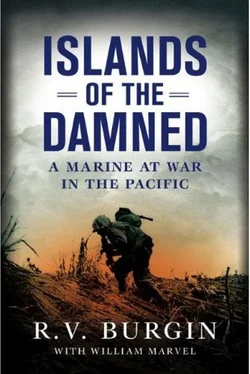We were to take the boat across to Banika, he told us, and guard a storehouse for two weeks. We’d heard of Banika, but none of us had been there. Everything good came from Banika. The Navy had a supply dump on the island. If we got fresh meat, it came over from Banika. If we got fresh eggs, they were from Banika.
One of us asked what we’d be guarding. Beer and soda pop, Haldane told us. A whole warehouse. Thousands of cases. It was like sending foxes to guard the chicken coop.
I figured afterward that Captain Haldane and our first sergeant, Mo Darsey, had gone down a list and handpicked us for the assignment. I can’t speak for myself, but everyone else chosen was a top-notch Marine. I felt proud to be in their company.
It didn’t take us long to get to our warehouse on Banika, about a twenty-mile boat ride from Pavuvu. We had two six-man pyramid tents, on real wooden platforms for a change. The duty was light. Four hours on, ninety-six hours off. For chow, we went down to the wharf and climbed on board a ship that was anchored there. The first time I went aboard I almost fainted. I had never seen anything like that in the Pacific.
When we went in they sat us down and brought us menus. There were napkins and tablecloths on the tables. White linen towels to dry your face and hands. After we looked over the menu, the waiter asked, “What will you have, sir?” We could order anything—breakfast, lunch or dinner—and he’d bring it to us like we were in a restaurant. I’d never dreamed of being served like that anywhere in the Marines. On a troopship you’d just go through a line and they’d dish it out, just slop it on your tray.
We helped ourselves to a share from the warehouse. It was hot, but it was beer.
One Saturday night on Banika four of us were sitting around—Hillbilly Jones, Yarborough, myself, and somebody else. Maybe Sarrett. I can’t recall. We were pouring 190-proof alcohol in the bottom of a canteen cup and filling the rest with grapefruit juice. We were singing and telling jokes and drinking that stuff, and by ten thirty we started to run low on grapefruit juice, and so we poured in more alcohol.
Oh, my God. You talk about drunk. I had to put all three of them to bed, I mean every single one. Haul him to his feet. There was a jeep outside that had a 250-gallon water tank on the back, with a spigot on the side. I’d wrestle each one out there and stick his head under the spigot and run water over him until I thought he could make it to the tent more or less upright. I’d get him there and put him on his cot. Tuck him in. All three of them.
And I was thinking, Man, I’m doing okay, you know? Here I’ve put these three drunks to bed and I’m still walking straight.
About three o’clock that morning I woke up vomiting. I want to tell you, I never vomited so hard in my life. I got up the next morning and looked over the side of my cot. And there was blood everywhere. I’d vomited so hard I’d vomited blood.
That was on Sunday morning. My first meal after that was on Thursday.
* * *
Toward the end of our stay on Pavuvu we had a visitor from Banika.
Bob Hope had been entertaining troops across the South Pacific. He had taken his whole USO troupe with him—singer Frances Langford, comedian Jerry Colonna, Tony Romano, who played the guitar. And a lively, pretty little blond dancer named Patty Thomas.
We weren’t on their schedule. They’d been to Christmas Island, Tarawa, Kwajalein, Saipan, Bougainville, Tulagi. A Catalina flying boat that was taking them to Australia had made a crash-landing in a river bar, but they’d made it out okay. In late July they were putting on a show over on Banika.
Somebody had flown over and told Hope there was a whole division stuck on this little island, about to go into battle. We hadn’t seen an outsider for months, much less a female outsider.
“Where are they?” he asked. Pavuvu, somebody told him.
Hope had never heard of it. “Where in the hell is that?” he asked.
We had no runway, but our one road could accommodate the occasional Piper Cub that flew in with messages or visiting officers. If the troupe could be ready the next morning, they could be flown over one by one.
We got word the same day and by next morning we had put up a makeshift stage down by the beach, at the end of an open area where we played baseball and drilled. By the time the first of the planes appeared, there must have been fifteen thousand of us standing in that field, all of us yelling our heads off. The pilot cut the engine on Jerry Colonna’s plane as it circled over and we heard him let out that famous Colonna howl: “Yee …ow …ow.” Even from the ground we could see his handlebar mustache and those shining white teeth.
The show lasted about ninety minutes, but it seemed shorter. Patty Thomas, who was wearing a skimpy skirt and a halter top, invited guys from the front rows to come up onstage and jitterbug with her. Hope and Colonna traded jokes.
Hope asked Colonna how he had enjoyed the flight from Banika.
“Tough sledding,” Colonna said.
“Why tough sledding?” Hope asked.
“No snow.”
We roared with laughter.
Somebody must have briefed them on Pavuvu, because Hope even got in a joke about our land crabs. He said they reminded him of Bing Crosby’s racehorses—“they run sideways.”
Pavuvu was so small, he said, “the gophers have to take turns coming up.”
At the end of the show, Hope sang his theme song, “Thanks for the Memories.” Then they got into their Piper Cubs and, one by one, took off. We stood alongside the road cheering.
For days afterward we’d talk about that show. It really lifted our spirits.
Years later, on one of his last television broadcasts, Hope called that appearance on Pavuvu one of the most moving shows he ever played.
“You knew when you walked out there that a lot of those guys you’d never see again,” he said. “And as it worked out sixty percent of these kids were knocked off.”
It was not quite as bad as that. But almost. Thirty percent of the First Division would be wounded or killed on Peleliu.
* * *
They passed around some maps and some fuzzy photographs taken from planes or through a submarine periscope. None of them showed any useful detail. It just looked like a lot of trees and some hills.
They’d also made a model. The island was even smaller than Pavuvu. We’d be landing across a wide beach stretching north to south. Two hundred yards beyond was the Jap airfield that was our first day’s objective. Behind the airfield, mountains rose up and continued almost the whole length of the island. Except for the hills, they told us, most of the place was flat.
They didn’t tell us the name yet.
Our training wrapped up with a couple big landing exercises. We didn’t have our amtracs. They were still busy on Guam. So we used Higgins boats. They told us to come out of the amtracs ready for anything. Have bayonets fixed, a round chambered in our rifles and the safety on. Locked and loaded. Our ammo carriers were to have a couple mortar shells unfastened and ready to go.
They repeated over and over again the lesson learned on Guadalcanal:
“Get off the beach! Get your ass off the beach! Move in!”
Late on August 26, we filed on board LST 661. The next morning we were under way.
An LST was the largest ship the Navy could actually put right up on a beach. The hold would be full of amtracs and the amtracs would be full of troops. The big clamshell doors in the front of the ship would open and you’d just roll ashore. If there was a coral reef off the beach, the LST would stay farther out and the amtracs would rumble down the ramp into the water, form up and move to the beach in waves. That’s how it was supposed to work. Every now and then, we’d heard, an amtrac would go down the ramp, nose into the water, and sink. Just disappear.
Читать дальше











